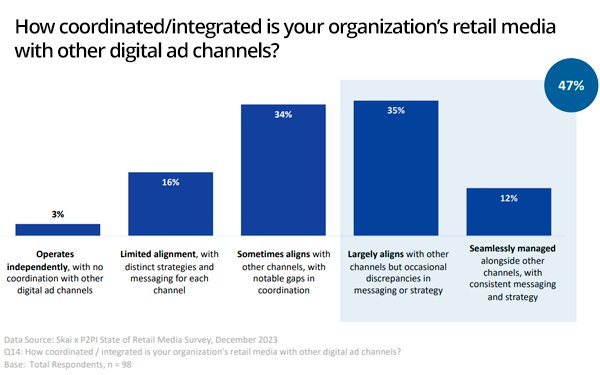
Retail media and paid online search are the most
important marketing channels to consumer product manufacturers and agencies today, according to a study released Wednesday from the digital agency Skai and the Path to Purchase Institute (P2PI).
Fifty-three percent of survey participants cited online paid search as extremely important, while 27% said it is very important, compared with 42% and 39%, respectively, for retail media.
The data also shows that 53% cited analytics and reporting limitations in retail media as the primary challenge that could stifle investments in the future.
Forty-one percent of respondents
cited lower return on investments (ROI) compared to other advertising channels, while 38% cite difficulty proving investment incrementality.
Skai and P2PI fielded the online report, State of
Retail Media, to analyze the importance of retail media in overall marketing channel strategy, the impact of artificial intelligence, ecommerce, media measurement, projected budget changes in
coming year, and much more.
advertisement
advertisement
The study -- conducted between Oct. 23 and Nov. 20, 2023 -- surveyed 98 professionals employed by consumer product manufacturers and agencies.
More than two-thirds of those surveyed said retail media has driven positive results for their organizations this year.
Companies leverage a variety of media in their retail media strategy
-- most often on-site ads, paid search shopping ads, social commerce, and off-site ads.
Seventy-seven percent of respondents to the study cited on-site digital ads on retail websites, while
69% cited paid search shopping ads such as Google Shopping, 65% cited social commerce such as TikTok Shops, 60% cited off-side ads but not on retail sites, 52% cited CRM like apps and email, 52%
cited in-store ads and signs, 48% cited digital in-store, and 38% cited marketing co-op.
Many survey respondents said they plan to increase 2024 budgets for retail media,
particularly paid-search shopping ads and on-site ads.
Sixty-nine percent plan to increase budgets in paid-search shopping ads, with 16% planning to increase them “significantly,”
24% moderately, and 29% slightly. Some 21% said they will keep budgets the same, while 4% see a slight decline, and 4% will not invest at all in paid-search shopping ads.
On-site digital ads
on retail sites lagged substantially behind paid search, with 9% of the 67% who plan to invest say they will significantly increase their budget. Twenty-nine percent will moderately increase their
budget, and 30% will slightly increase their budget.
The survey results reveal that retail-media budget allocations are most often driven by performance measurement.
The data shows an
interest in testing new ad formats and types, targeting options and/or bid adjustments from retailers, and annual budgets set on performance in the previous year.
When asked to cite the
factors that are most important to budget allocation decisions for retail media, 56% cited following performance measurement, while 50% cited testing of new ad formats and types. Among the survey
participants, 48% cited annual budgets based on the previous year's performance.
Of those surveyed, 47% said their organizations would accelerate investments in retail media if it delivered a
higher return on investment (ROI) compared with other channels.